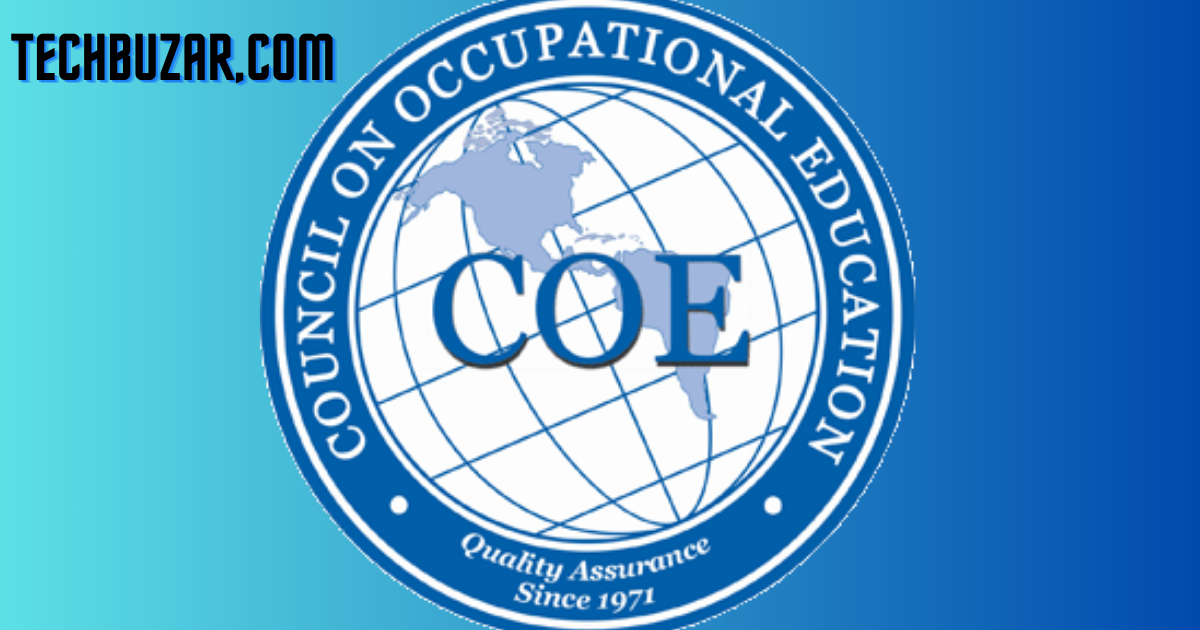
Council on Occupational Education (COE)
The Council on Occupational Education (COE) stands as a pivotal force in shaping and advancing vocational and occupational education across various institutions. As a premier accrediting agency, the COE plays a crucial role in ensuring the quality and effectiveness of career and technical education programs. With a commitment to promoting excellence and innovation in occupational education, the COE serves as a trusted resource for institutions seeking accreditation and recognition.
This introduction of Council on Occupational Education (COE)aims to provide a glimpse into the significance and purpose of the Council on Occupational Education, an organization dedicated to advancing the field of occupational education and ensuring that learners receive education that meets the highest standards of excellence and relevance in today’s dynamic and competitive job market.
Accreditation Process of Council on Occupational Education (COE):
The accreditation process conducted by the Council on Occupational Education (COE) is a comprehensive and thorough evaluation designed to assess the quality and effectiveness of educational institutions offering occupational programs. The process typically involves the following key steps:
Initial Inquiry and Candidacy:
Institutions interested in seeking accreditation from COE begin by submitting an initial inquiry. After determining eligibility, institutions may enter the candidacy phase. During candidacy, institutions work towards meeting COE standards and prepare for the accreditation process.
Self-Study with help of Council on Occupational Education (COE):
Institutions seeking accreditation are required to conduct a self-study, which is a detailed and introspective analysis of their programs, policies, and operations. This involves assessing how well the institution aligns with COE’s standards and criteria for accreditation.
Preparation of Report:
Based on the self-study, institutions compile a comprehensive report that provides evidence of compliance with Council on Occupational Education (COE) standards. This report outlines the institution’s strengths, challenges, and plans for improvement, demonstrating a commitment to delivering high-quality occupational education.
Site Visit:
COE appoints a team of experienced evaluators to conduct an on-site visit to the institution. The site visit allows evaluators to verify the information presented in the self-study, assess the institution’s facilities, and engage with faculty, staff, students, and other stakeholders to gain a comprehensive understanding of the institution’s operations.
Evaluation by COE Commission:
Following the site visit, the evaluators submit a report to the COE Commission. The Commission carefully reviews all documentation, including the self-study, site visit report, and any additional information provided by the institution. The evaluation considers adherence to COE standards and the institution’s commitment to continuous improvement.
Decision on Accreditation:
The COE Commission makes a decision regarding the accreditation status of the institution. Accreditation may be granted, denied, or deferred based on the institution’s compliance with COE standards. If accredited, the institution is required to uphold these standards and participate in ongoing evaluations to maintain accreditation.
Continuous Improvement and Renewal in Council on Occupational Education (COE):
Accredited institutions commit to continuous improvement, regularly assessing and enhancing their programs to meet evolving industry needs. Accreditation is typically granted for a specific period, after which institutions undergo a renewal process to ensure ongoing compliance with COE standards.
The accreditation process by the Council on Occupational Education is designed to be collaborative, transparent, and focused on fostering educational excellence and innovation in occupational programs. It provides institutions with a framework for self-assessment, improvement, and accountability in delivering high-quality vocational and technical education.
Benefits of Accreditation:
Accreditation by a recognized accrediting body, such as the Council on Occupational Education (COE), offers numerous benefits for educational institutions, students, employers, and the broader community. Some key advantages include:
Quality Assurance:
Accreditation serves as a mark of quality assurance, indicating that an institution has undergone a thorough evaluation and meets established standards. This helps to instill confidence in students, employers, and the public regarding the educational quality and effectiveness of the institution.
Credibility and Reputation:
Accreditation enhances an institution’s credibility and reputation. It signifies that the institution is committed to maintaining high standards and continually improving its programs. Accreditation is often considered a significant factor in decision-making for students and employers.
Transferability of Credits:
Accreditation facilitates the smooth transfer of credits between accredited institutions. Students who have completed coursework at an accredited institution are more likely to have their credits recognized by other accredited institutions, providing greater flexibility in pursuing advanced degrees or transferring between programs.
Access to Federal Funding:
Accredited institutions are eligible for federal funding programs, including financial aid for students. This ensures that students attending accredited institutions have access to federal grants, loans, and other financial assistance to support their education.
Employer Confidence:
Accreditation is often seen as a validation of the relevance and quality of an institution’s programs by employers. Graduates from accredited programs are perceived as having received a solid education, making them more attractive candidates in the job market.
Employer Confidence:
Accreditation is often seen as a validation of the relevance and quality of an institution’s programs by employers. Graduates from accredited programs are perceived as having received a solid education, making them more attractive candidates in the job market.
Global Recognition:
Accreditation by a reputable accrediting body enhances an institution’s global recognition. It may facilitate partnerships with international institutions, collaborations, and exchanges, contributing to a more diverse and enriching educational experience for students.
Compliance with Regulatory Requirements:
Accredited institutions often find it easier to comply with various regulatory requirements imposed by local, state, and federal authorities. Accreditation can streamline administrative processes and demonstrate an institution’s commitment to meeting regulatory standards.
Student and Stakeholder Satisfaction:
Accreditation contributes to overall student and stakeholder satisfaction. Knowing that an institution is accredited provides assurance to students and their families that they are investing in a quality education that aligns with industry standards.
Networking Opportunities:
Accredited institutions often become part of a network of peer institutions. This can lead to valuable collaborations, sharing of best practices, and opportunities for professional development among faculty and staff.
Regional Focus of Council on Occupational Education (COE):
The Council on Occupational Education (COE) primarily focuses on accrediting educational institutions in the United States that offer occupational and career-oriented programs. As an accrediting agency, its regional focus aligns with the institutions it evaluates, which are predominantly located within the United States.
The COE’s accreditation activities are not limited to a specific geographic region within the United States but encompass institutions across the entire country. These institutions may include postsecondary career and technical schools, community colleges, and other specialized training providers offering programs in fields such as healthcare, technology, business, and various vocational disciplines.
It’s important to note that accrediting bodies often have a defined scope and jurisdiction, and the COE’s primary focus is on institutions operating within the United States. While regional accrediting agencies in the U.S. typically have specific geographic territories, the COE’s mission is more specialized in the realm of occupational education.
Institutions seeking accreditation from the COE must demonstrate compliance with the organization’s standards and criteria, which are designed to ensure the quality and relevance of occupational education programs. The COE’s commitment to excellence in occupational education contributes to the advancement of workforce development and the preparation of individuals for successful careers in a variety of industries.
Collaboration and Partnerships of Council on Occupational Education (COE):
Collaboration and partnerships are crucial elements in the realm of occupational education, and the Council on Occupational Education (COE) actively encourages and supports such initiatives. Institutions accredited by the COE often engage in collaborative efforts with various stakeholders to enhance the quality of education, improve program outcomes, and address the evolving needs of the workforce. Here are some ways in which collaboration and partnerships play a vital role in the context of COE-accredited institutions:
Industry Partnerships:
COE-accredited institutions often form partnerships with industries relevant to their occupational programs. Collaborating with employers and industry professionals helps ensure that educational programs align with current industry standards, providing students with practical skills and knowledge that are in demand in the job market.
Advisory Committees:
Many COE-accredited institutions establish advisory committees comprising industry experts, employers, and community representatives. These committees provide valuable insights into industry trends, workforce needs, and the skills required by graduates. The collaboration helps institutions tailor their programs to meet real-world demands.
Community Engagement:
Collaboration with local communities is essential for occupational education institutions. COE-accredited institutions often engage in community outreach programs, partnerships with local businesses, and initiatives that address the specific needs of the communities they serve.
Articulation Agreements:
COE-accredited institutions may enter into articulation agreements with other educational institutions, facilitating the seamless transfer of credits between programs. This encourages academic collaboration and creates pathways for students to pursue advanced degrees or transfer between institutions.
Professional Development:
Collaborative efforts extend to faculty and staff development. COE-accredited institutions may partner with professional organizations, attend conferences, and participate in training programs to keep educators abreast of the latest industry trends and teaching methodologies.
Research and Innovation:
Collaboration often sparks research initiatives and innovative projects. COE-accredited institutions may work together or partner with external organizations to conduct research that enhances the understanding of effective teaching methods, industry advancements, and the impact of occupational education on workforce development.
Technology Partnerships:
In an era of rapid technological advancement, COE-accredited institutions collaborate with technology partners to integrate cutting-edge tools and resources into their programs. This ensures that students are well-prepared for technologically-driven careers.
International Collaborations:
While the Council on Occupational Education (COE) primary focus is within the United States, some institutions may engage in international collaborations. This can include partnerships with educational institutions, organizations, or businesses in other countries, fostering global perspectives and opportunities for students.
By fostering collaboration and partnerships, COE-accredited institutions strengthen their ability to provide high-quality, relevant occupational education. These partnerships contribute to the success of students, the effectiveness of educational programs, and the overall advancement of workforce development.
Challenges and Future Directions:
Emphasis on Digital Literacy:
The future of occupational education may see an increased emphasis on digital literacy. Integrating technology across programs can prepare students for careers in rapidly evolving digital environments.
Flexible and Adaptive Programs:
Future occupational education programs may become more flexible and adaptive, allowing for personalized learning experiences that cater to individual student needs and industry demands.
Flexible and Adaptive Programs:
Future occupational education programs may become more flexible and adaptive, allowing for personalized learning experiences that cater to individual student needs and industry demands.
Flexible and Adaptive Programs:
Future occupational education programs may become more flexible and adaptive, allowing for personalized learning experiences that cater to individual student needs and industry demands.
Focus on Soft Skills:
Recognizing the importance of soft skills such as communication, problem-solving, and adaptability, future occupational education programs may integrate these skills more deliberately into their curricula.
Global Perspectives and Cultural Competence:
As the workforce becomes more globalized, occupational education may incorporate a stronger focus on cultural competence and global perspectives to prepare students for diverse work environments.
Innovations in Assessment:
Future directions may include innovations in assessment methods to better measure not only technical skills but also the ability to apply knowledge in practical scenarios, fostering a more holistic approach to evaluation.
Adapting to these challenges and embracing future directions requires collaboration, innovation, and a commitment to continuous improvement by both the COE and the institutions it accredits. By addressing these challenges and proactively shaping future directions, occupational education can continue to play a vital role in preparing individuals for successful and fulfilling careers.
Conclusion of Council on Occupational Education (COE):
In conclusion, the Council on Occupational Education (COE) plays a pivotal role in advancing the field of occupational education by providing accreditation to institutions dedicated to preparing students for successful careers. The accreditation process ensures a commitment to high standards, continuous improvement, and responsiveness to the evolving needs of the workforce.
As the COE and its accredited institutions continue to address challenges and embrace future directions, they contribute significantly to workforce development, equipping individuals with the skills and knowledge needed to thrive in diverse and dynamic careers. The commitment to excellence, continuous improvement, and collaboration underscores the importance of the COE in shaping the future of occupational education and meeting the demands of an ever-evolving global workforce.



You made a number of fine points there. I did a search on the subject and found the majority of persons will consent with your blog.
One thing I would really like to say is that often car insurance termination is a terrifying experience and if you are doing the suitable things as being a driver you simply will not get one. A number of people do are sent the notice that they have been officially dropped by their insurance company they have to fight to get supplemental insurance from a cancellation. Low-cost auto insurance rates are usually hard to get after having a cancellation. Having the main reasons regarding auto insurance cancellation can help individuals prevent completely losing in one of the most crucial privileges readily available. Thanks for the strategies shared via your blog.
Most of what you articulate happens to be astonishingly accurate and it makes me wonder why I had not looked at this with this light before. This particular article really did switch the light on for me as far as this particular subject goes. However at this time there is one point I am not too cozy with and while I try to reconcile that with the main theme of your point, permit me observe just what the rest of the readers have to point out.Nicely done.
Hi! Do you know if they make any plugins to help with Search Engine Optimization? I’m trying to get my blog to rank for some targeted keywords but I’m not seeing very good gains. If you know of any please share. Thank you!
Very well written information. It will be supportive to anyone who utilizes it, as well as me. Keep up the good work – i will definitely read more posts.
Good blog! I really love how it is easy on my eyes and the data are well written. I’m wondering how I might be notified when a new post has been made. I have subscribed to your RSS which must do the trick! Have a nice day!
Wow! This could be one particular of the most beneficial blogs We’ve ever arrive across on this subject. Basically Fantastic. I’m also a specialist in this topic therefore I can understand your effort.
Thanks for expressing your ideas. Something is that scholars have a choice between national student loan and also a private student loan where it’s easier to choose student loan online debt consolidation than in the federal education loan.